Letters from Lodi
An insightful and objective look at viticulture and winemaking from the Lodi
Appellation and the growers and vintners behind these crafts. Told from the
perspective of multi-award winning wine journalist, Randy Caparoso.
Our favorite historic passages extolling the glories of wine
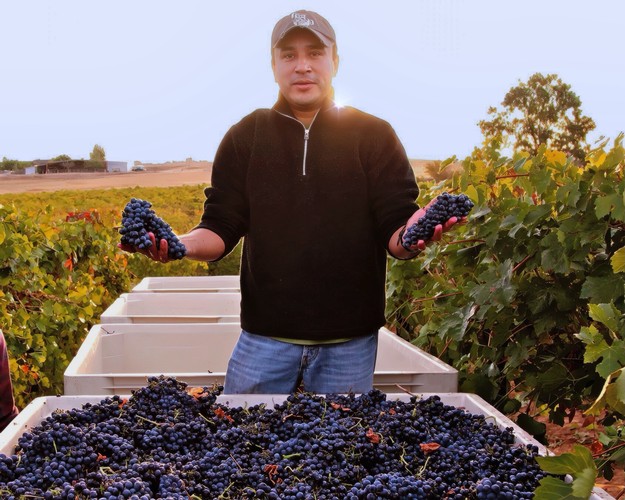
Anaya Vineyards' Gerardo Espinosa—recently recognized as one of Wine Enthusiast's 2024 Future 40 Tastemakers—harvesting his family grown Petite Sirah.
Over the past four or five years the wine industry in California has been dealing with the serious issue of overplanting of grapes⏤a crisis that has been challenging wine industries in virtually every wine producing country in the world over the past twenty years (see our previous post, While wine consumption in the U.S. slumps, American appreciation of wine grows unabated)..
This has led to quite a bit of hand-wringing, particularly in mainstream press. The oversupply of grapes, combined with recent statistics demonstrating a leveling off of consumer consumption in the U.S., is being described in a number of ways⏤a "grape apocalypse," a "dangerous crossroads," an "unprecedented" or "existential crisis," and so forth⏤leading to the conclusion: The American wine industry is in danger of shutting down.
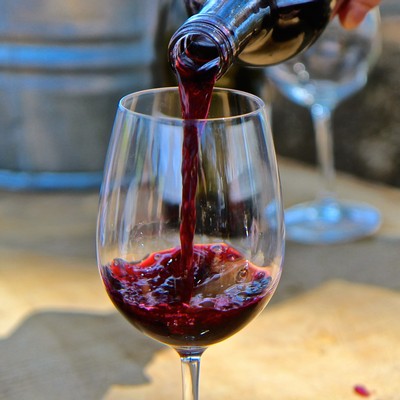
Barrel sample of Cabernet Sauvignon, the most popular premium varietal red in America today.
You can take this to the bank: The American wine industry is not in danger of shutting down. Mistakes, granted, have been made, and a course-correction is underway. Meanwhile, though, other figures have been coming out which seem to indicate an opposite trend. A big one is the fact that wine sales in the U.S. has been on a steady upswing, increasing by over $15 billion just over the past three years (see Forbes, U.S. Wine Industry surpasses $107 Billion in Sales).
Ergo: While industries around the world are currently hampered by a glut of wine grape, pure, unadulterated appreciation of wine⏤at least in the U.S.⏤has continued to explode. Dramatically.
Wine, after all, as the editor of The New York Times recently reminded readers, is a beverage espousing "beauty and joy... which has been embraced by humans since the dawn of civilization." He does not exaggerate. We recently posted our own piece on the history of grape growing and wine production: It goes back a staggering 9,000 years (see our post, The 9,000-year history of Vitis vinifera), and is not going away anytime soon.

Ancient Egypt hieroglyph depicting the science and art of viticulture and winemaking around 3000 BC.
There is archeological evidence tracing the deliberate cultivation of grapevines specifically to attain preferred qualities in resulting wines to regions in the vicinity of the Caucasus Mountains dating as far back as 7,000 BC.
Scientists studying grapevine genomes are convinced that the precursors of very same grape varieties grown and bottled today were most likely cultivated in Greece as long ago as 6,400 BC. The same practices were then transplanted to Egypt by 3,000 BC, to Italy by 2,000 BC, to Spain by 800 BC, and reached France by 500 BC. The science of winegrowing is old. Wine appreciation is just as old and time honored. It's probably like rock and roll⏤undoubtedly it will never die.

Late 1800s photo of Georgia vintner with qveri, large clay pots utilized for fermentation and aging of wines in the Transcaucasia region for thousands of years, and being revived today.
By the same token, scribes have been celebrating the significance of wine in the lives of humankind for nearly as long, which gives us a good excuse to post a litany of favorite quotes doing just that.
It is always good to read what the most famous or eloquent of writers in the past have said about wine. The biggest reason? Because, when you digest and savor their words, you realize that they feel exactly the same way about wine as we do, whether talking about it over 2,000 years ago or just forty or fifty years ago!
Some favorite passages:
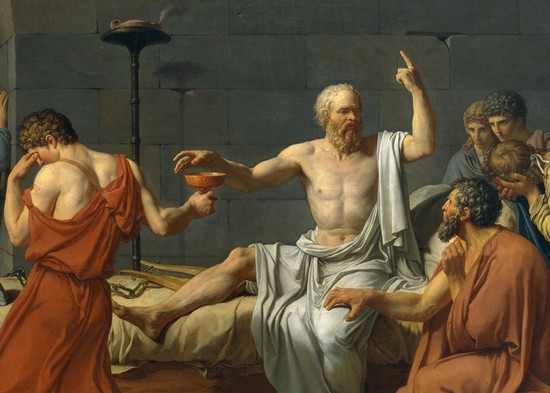
The legendary Greek philosopher Socrates (by Jacque Louiis David, 1787), who always found truth in wine.
Here Socrates again interposed. "Well, gentlemen," said he, "so far as drinking is concerned, you have my hearty approval; for wine does of a truth 'moisten the soul' and lull our griefs to sleep just as a mandragora does with men, at the same time awakening kindly feelings as oil quickens a flame. However, I suspect that men's bodies fare the same as those of plants that grow in the ground. When God gives the plants water in floods to drink, they cannot stand up straight or let breezes blow through them; but when they drink only as much as they enjoy, they grow up very straight and tall and come to full and abundant fruitage.
⏤Symposium by Xenophon (360s BC)
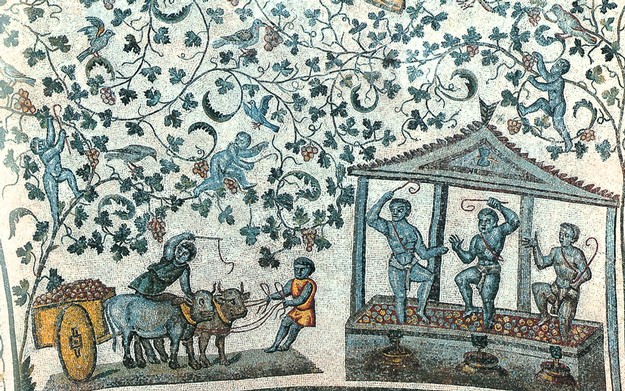
4th century AD Roman mosaic of a grape harvest and winemaking.
The cultivated vine is kept down by pruning every year, and all the strength of the tree is drawn as much as possible into the shoots, or else thrown downwards to the sets; indeed, it is only allowed to expand with the view of ensuring an abundant supply of juice, a result which is obtained in various modes according to the peculiarities of the climate and the nature of the soil...
Democritus, who has declared that he was acquainted with every variety of the grape known in Greece, is the only person who has been of opinion that every kind could be be enumerated; but, on the other hand, the rest of the authors have stated that they are quite innumerable and of infinite extent, an assertion the truth of which will be more evident, if we only consider the vast number of wines...
It is the property of wine, when drunk, to cause a feeling of warmth in the interior of the viscera, and, when poured upon the exterior of the body, to be cool and refreshing. It will not be foreign to my purpose on the present occasion to state the advice which Androcydes, a man famous for his wisdom, wrote to Alexander the Great, with the view of putting a check on his intemperance: "When you are about to drink wine, O king!" said he, "remember that you are about to drink the blood of the earth..."
⏤The Natural History by Pliny the Elder (77-79 AD)
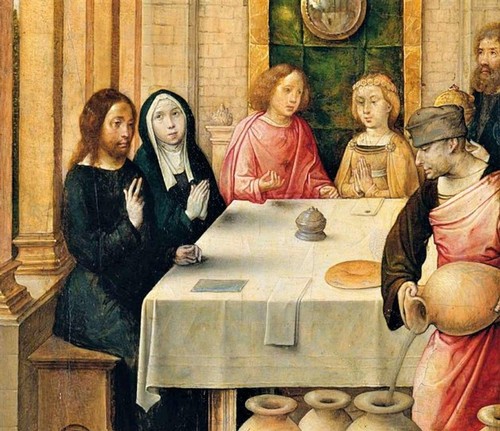
The wedding at Cana by Juan de Flandes (1500).
On the third day there was a wedding at Cana in Galilee, and the mother of Jesus was there. Jesus also was invited to the wedding with his disciples. When the wine ran out, the mother of Jesus said to him, “They have no wine.” And Jesus said to her, “Woman, what does this have to do with me? My hour has not yet come.” His mother said to the servants, “Do whatever he tells you.”
Now there were six stone water jars there for the Jewish rites of purification, each holding twenty or thirty gallons. Jesus said to the servants, “Fill the jars with water.” And they filled them up to the brim. And he said to them, “Now draw some out and take it to the master of the feast.” So they took it. When the master of the feast tasted the water now become wine, and did not know where it came from (though the servants who had drawn the water knew), the master of the feast called the bridegroom and said to him, “Everyone serves the good wine first, and when people have drunk freely, then the poor wine. But you have kept the good wine until now.”
⏤Gospel of John (90-110 AD)
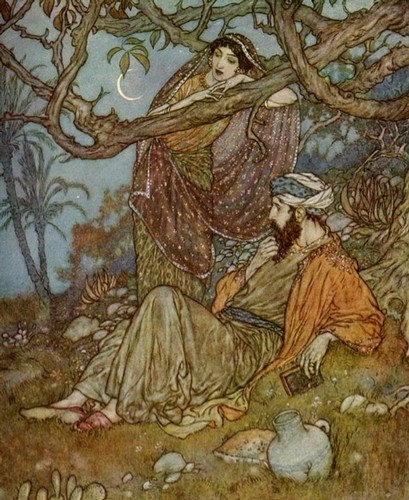
"The jug of wine and book of verses" from The Rubaiyat (Edward Fitzgerald translation, 1859)
A Book of Verses underneath the Bough,
A Jug of Wine, A Loaf of Bread—and Thou
Beside me singing in the Wilderness—
Oh, Wilderness were Paradise enow!
⏤The Rubaiyat of Omar Khayyan (1048-1131)

1552 edition of Andrew Boorde's Dyetary of Helth.
Choose your wine after this sort; it must be fragrant and redolent, having a good odour and flavour in the nose; it must sprinkle in the cup when it is drawn and put out of the pot into the cup; it must be cold and pleasant in the mouth; it must be strong and subtle of substance. And then moderately drunken it doth quicken a man's wits, it doth comfort the heart, it doth scour the liver; specially if it be white wine, it doth rejoice all the powers of man, and doth nourish them; it doth engender good blood, it doth comfort and nourish the brain and all the body, and it resolveth fleume; it engendereth heat, and is good against heaviness and pensifulness; it is full of agility; wherefore it is medicinable, specially white wine, for it doth mundify and cleanse the wounds and sores.
⏤Dyetary of Helth by Andrew Boorde (1562)

Sancho Panza, Don Quixote's faithful squire and, by birth, an inveterate wine connoisseur.
"But tell me, senor, by what you love best, is this Ciudad Real wine?" "O rare wine-taster!" said he of the Grove; "nowhere else indeed does it come from, and it has some years' age too." "Leave me alone for that," said Sancho; "never fear but I'll hit upon the place it came from somehow. What would you say, sir squire, to my having such a great natural instinct in judging wines that you have only to let me smell one and I can tell positively its country, its kind, its flavour and soundness, the changes it will undergo, and everything that appertains to a wine? But it is no wonder, for I have had in my family, on my father's side, the two best wine-tasters that have been known in La Mancha for many a long year, and to prove it I'll tell you now a thing that happened to them.
"They gave the two of them some wine out of a cask, to try, asking their opinion as to the condition, quality, goodness or badness of the wine. One of them tried it with the tip of his tongue, the other did no more than bring it to his nose. The first said the wine had a flavour of iron, the second said it had a stronger flavour of cordovan. The owner said the cask was clean, and that nothing had been added to the wine from which it could have got a flavour of either iron or leather. Nevertheless, these two great wine-tasters held to what they had said. Time went by, the wine was sold, and when they came to clean out the cask, they found in it a small key hanging to a thong of cordovan..."
—Don Quixote by Miguel de Cervantes (1605-1615)
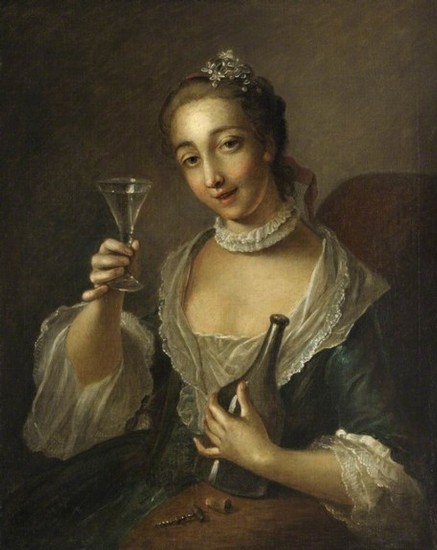
"Portrait of a Girl with a Bottle and Glass" by Philippe Mercier (1760).
O, for a draught of vintage! that hath been
Cool'd a long age in the deep-delved earth,
Tasting of Flora and the country green,
Dance, and Provençal song, and sunburnt mirth!
O for a beaker full of the warm South,
Full of the true, the blushful Hippocrene,
With beaded bubbles winking at the brim,
And purple-stained mouth;
That I might drink, and leave the world unseen,
And with thee fade away into the forest dim...
⏤Ode to a Nightingale by John Keats (1819)
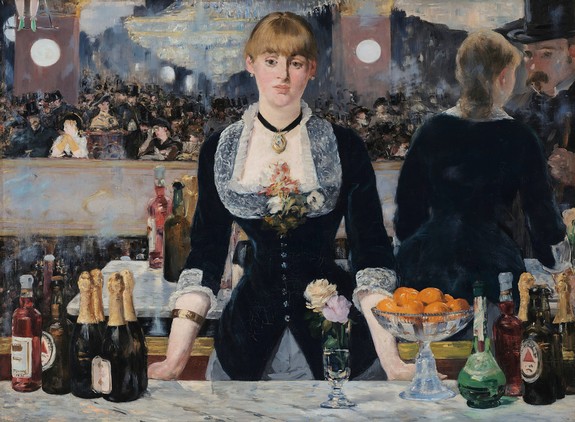
"Un Bar aux Folies Bergère" by Édouard Manet (1882).
Let us have wine and woman, mirth and laughter,
Sermons and soda water the day after.
⏤Don Juan by Lord Byron (1819)
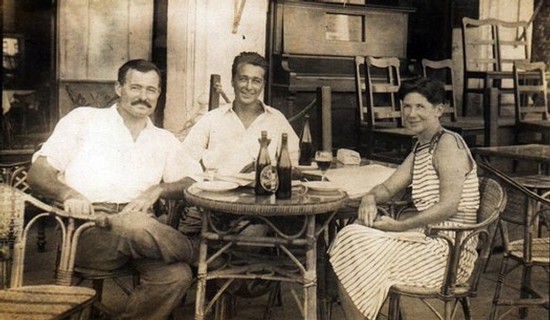
Ernest Hemingway (left) in Spain, circa 1930s.
The comparison [of bullfighting] with wine drinking is not so far-fetched as it might seem. Wine is one of the most civilized things in the world and one of the natural things of the world that that been brought to the greatest perfection, and it offers a greater range for enjoyment and appreciation than, possibly, any other purely sensory thing which may be purchased. One can learn about wines and pursue the education of one's palate with great enjoyment all of a lifetime, the palate becoming more educated and capable of appreciation of wine and you having constantly increasing enjoyment and appreciation of wine even though the kidneys may weaken, the big toe becomes painful, the finger joints stiffen, until finally, just when you love it the most you are finally forbidden wine entirely...
—Death in the Afternoon by Ernest Hemingway (1932)
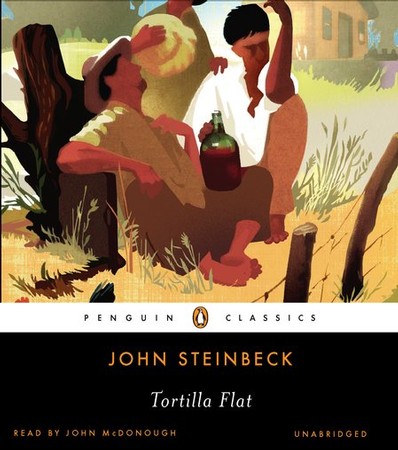
John Steinbeck's Tortilla Flat (cover by Mike Wiggins).
Two gallons is a great deal of wine, even for two paisanos. Spiritually the jugs may be graduated thus: Just below the shoulder of the first bottle, serious and concentrated conversation. Two inches farther down, sweetly sad memory. Three inches more, thoughts of old and satisfactory loves. An inch, thoughts of old and bitter loves. Bottom of the first jug, general and undirected sadness. Shoulder of the second jug, black unholy despondency. Two fingers down a song of death or longing. A thumb, every other song each one knows. The graduations stop here, for the trail splits and there is no certainty. From this point on anything can happen..
⏤Tortilla Flat by John Steinbeck (1935)
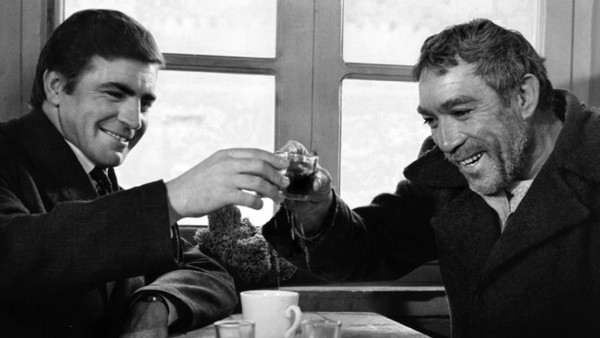
Anthony Quinn (right) in the 1964 film Zorba the Greek.
"Now, whatever is this red water, boss, just tell me! An old stock grows branches, and at first there’s nothing but a sour bunch of beads hanging down. Time passes, the sun ripens them, they become as sweet as honey, and then they’re called grapes. We trample them; we extract the juice and put it into casks; it ferments on its own, we open it on the feast-day of St. John-the-Drinker, it’s become wine! It’s a miracle! You drink the red juice and, lo and behold, your soul grows big, too big for the old carcass, it challenges God to a fight. Now tell me, boss, how does it happen?”
"Pour out some wine, Zorba," I said. "Fill the glasses to the brim and we'll drain them."
We clinked glasses and tasted the wine, an exquisite Cretan wine, a rich red color, like hare's blood. When you drank it, you felt as if you were in communion with the blood of the earth itself and you became a sort of ogre. Your veins overflowed with strength, your heart with goodness! If you were a lamb you turned into a lion. You forgot the pettiness of life, constraints all fell away. United to man, beast and God, you felt that you were one with the universe.
⏤Zorba the Greek by Nikos Kazantzakis (1946)
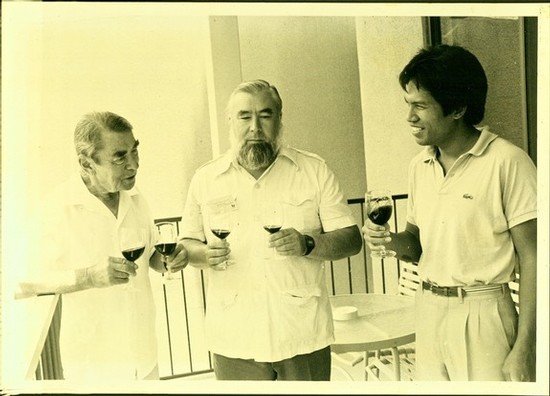
André Tchlistcheff (left) in 1982, humoring the author (right) and John Salvi MW by tasting a Napa Valley Cabernet Sauvignon alongside a Bordeaux grand cru.
I never willingly compare European wines against California wines. Because I would do great harm to the image of them both. I apply the same philosophy not only to European and California wines, but Australian and South American wines as well. There were great wines of Chile, of Argentina, great wines of South Africa, Australia, California and Europe. Each one of them should be classified individually, and never be compared. Genetically, we tend to compare them since they come from the same genetic variety, but under absolutely different ecological regimes. As my son is a genetic type of André Tchelistcheff, I am a genetic type of Victor Tchelistcheff, Sr., but I am entirely different from my father, as my son is from me. So inherited genetic character is visible, but does not represent my personality. Physically, yes, but not spiritually or in the complex of my individuality. That's the whole damn thing! They are ruining their reputation in Bordeaux and ruining their reputation in California. It may be attractive to the public, very good food for commercial advertising, but not for me.
⏤Andre Tchelistcheff in Benson, Great Winemakers of California (1976)

Kermit Lynch (photo by Kyle Johnson).
Once I took an afternoon off from wine tasting in Tuscany to visit a little museum in Florence, where two recently discovered Greek statues were on display. The lager-than-life statues had a manlike shape and a heart-stopping, godlike presence. How had man created something so powerfully exquisite? Wine can produce the same reaction, but unlike music, literature, or visual arts, a great wine does not require a creative genius. A farmer working his piece of earth can produce something inspiring and profound.
There is so much contained in a glass of good wine. It is a gift of nature that tastes of man's foibles, his sense of the beautiful, his idealism and virtuosity.
⏤Adventures on the Wine Route by Kermit Lynch (1988)

Popular author/wine lover Jim Harrison.
The simple act of opening a bottle of wine has brought more happiness to the human race than all the collective governments in the history of earth.
—Off to the Side: A Memoir by Jim Harrison (2007)
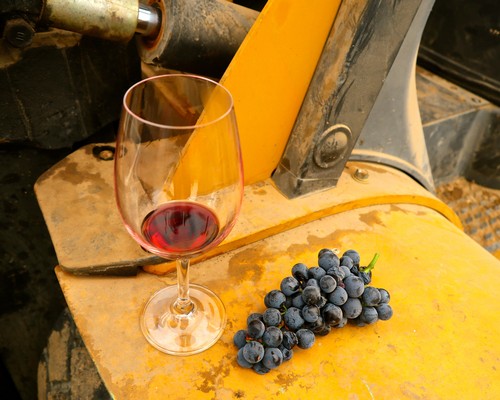
Glass and cluster of Lodi grown Syrah.